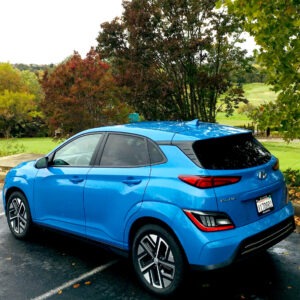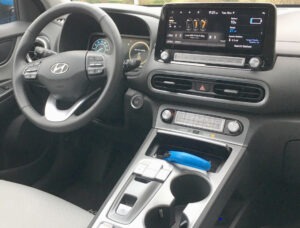A battery issue is a major concern for the folks at Hyundai.

The “issues” were not minor, a fire risk with its 64.0-kWh battery pack that led to a reduction in sales for the popular Kona Electric. That resulted in a massive battery recall that the South Korean automaker is hoping has eradicated the problem.
It might not be related to the battery problem, but Hyundai announced in April 2021 that it would no longer be selling the Kona EV domestically.
On the home front, the company has seemingly put more of its focus on the Ioniq 5, another small EV that some might argue is a direct competitor of the Kona.
The Ioniq 5 is a remarkable small SUV in many areas, one that has futuristic styling, advanced technology and a unique interior. Another positive is its range – between 269 to 300 miles.
It’s the first Hyundai that was designed solely as an EV and reportedly will be the first of 23 battery-electric vehicles the company will produce by 2025.
Despite the emergence of the Ioniq 5, Hyundai is not giving up on the Kona EV, which is available in two trim models (SEL, Limited).
The company refreshed the 2022 Hyundai Kona EV, giving it a crisp exterior design (new front and rear bumpers and wheel designs), a redesigned lower center console, and Blue Link-connected car system.
Despite the alarming issues with its battery, the Kona EV still has a strong upside. Since being introduced in 2018, sales have been solid for the subcompact crossover SUV, thanks to a pair of major enticements – good range at 258 miles and its affordable starting price of $34,100.
The Kona EV has a bunch of worthy rivals in the Chevrolet Bolt EUV, Volkswagen ID4, Nissan Leaf Plus, Nissan Ariya, and Tesla Model Y.
In a previous test drive of the Kona EV, we don’t recall having sport mode as an option. And what an option it is, elevating the small SUV to a quick one that scoots along the roadway in rapid fashion.
Even in normal mode, there’s definitely some pep to the front-wheel drive Kona EV, which delivers 201 horsepower and 291 pound-feet of torque. In sport mode, it reportedly travels 0-60 mph in 6.4 seconds.

The Kona EV can top out at 104 mph and gets the equivalent of 108-132 mpge, thanks in part to having regenerative braking. While not overly exciting to drive, the Kona EV delivers a stable, quiet, confident ride and the braking is excellent in slowing down the SUV without ever touching the brake pedal.
Standard safety features include rear cross-traffic alert, lane following, blind-spot monitoring, automatic emergency braking, and driver attention warning.
2022 HYUNDAI KONA EV
- Performance: electric motor, 201 horsepower
- Mileage estimate: 108-132 mpge
- Price estimate: $34,100 to $42,600
- Warranty: 5 years/60,000 miles; drivetrain: 5 years/60,00; unlimited: 7/unlimited
The Kona has a good overall interior that features standard items like a new 9-inch touchscreen infotainment system, 10.3-inch digital instrument display, six-speaker audio system, and Android Auto and Apple CarPlay capability. It also has a new lower center console area with wireless charging capability.
The seating is about average for a typical compact SUV, meaning there’s acceptable leg and head room up front, while the back seat feels a little cramped, especially for three adults. The cargo area is 19.2 cubic-feet and expands to 45.8 cubes with the rear seat folded flat.
Assuming its battery issues are a thing of the past, the 2022 Hyundai Kona EV should continue to be a strong candidate for electric SUV buyers.
It offers everything that people love about the gasoline-powered Kona, but with an electric twist that will attract an entirely different audience of admirers. Good range and affordable price remain its major calling cards.
Weidel on Wheels is featured regularly on www.tahoeskiworld.com. Auto writer Jeffrey Weidel can be reached at [email protected]. Follow him on Twitter at @jeffweidel.